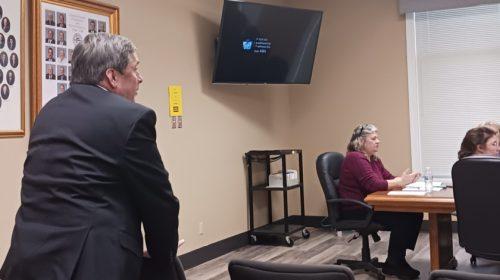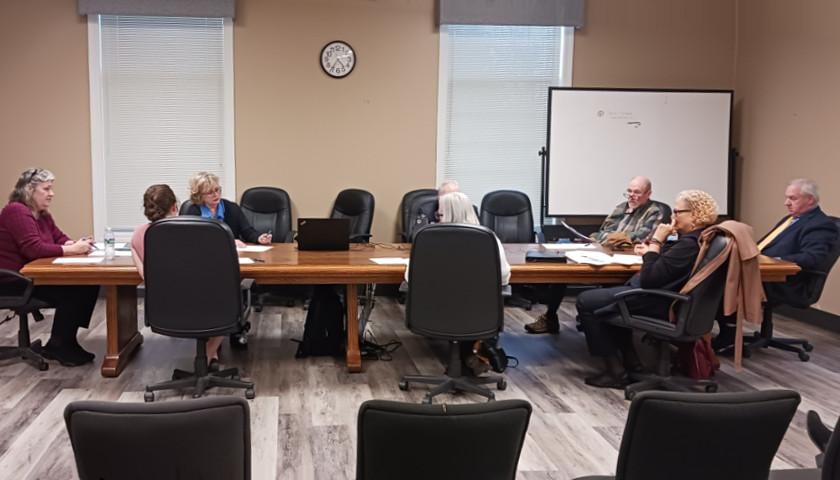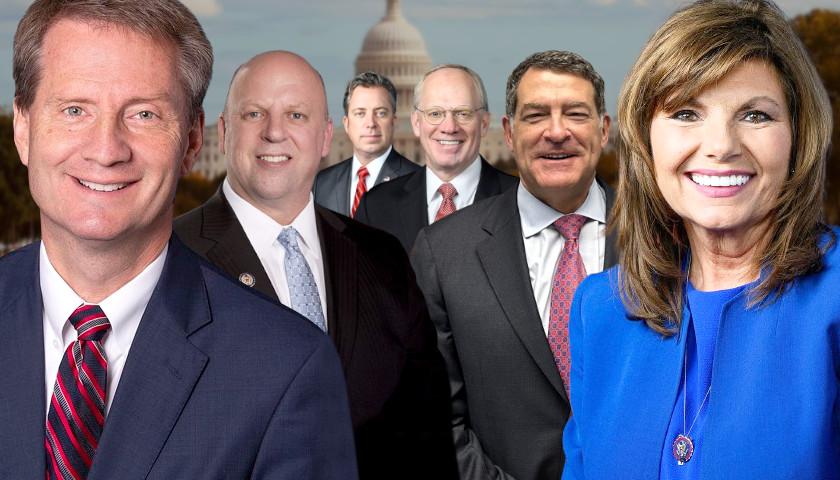GALLATIN, Tennessee – The Sumner County Election Commission (SCEC), on a 3 to 2 voice vote, decided in its regularly scheduled meeting Tuesday to engage the services of legal counsel to represent them against the County Commission. The attorney specifically named in the motion is a principal with the law firm’s lobbying affiliate that also represents MicroVote General Corporation, makers of the voting machines used in Sumner County elections.
In his motion, Republican-appointed SCEC member Mike Fussell made the unusual move of specifically naming attorney Tom Lee to provide the legal services as one “who is very familiar with the workings of Sumner County government.”
Lee is a partner at Frost Brown Todd, who “practices in the areas of government services and business litigation, concentrating his work on lobbying and government relations, and providing strategic counsel on managing public policy change on state and local levels,” according to his biography on the firm’s website.
Lee is also a principal at Civic-Point, a lobbying firm that uses its political capital to influence policy and public opinion to achieve their clients’ goals. Lee was a senior advisor for policy and communications to the 2006 U.S. Senate campaign of Democratic Rep. Harold Ford, Jr. as well as a senior advisor to Nashville Democratic mayoral candidate Karl Dean.
Another principal at the 20-member Civic-Point team is Debra Maggart, former Republican State Representative for the 45th District, which lies wholly within Sumner County.
MicroVote’s reporting to the Tennessee Bureau of Ethics and Campaign Finance shows that they have employed Maggart as their lobbyist since 2018.
On the Civic-Point website, Lee and Maggart indicate that their contact email is a “@civic-point.com” address. However, on their lobbyist registrations with the state, Lee and Maggart indicate “@fbtlaw.com” email addresses. Eighteen of the 20 Civic-Point team members are also listed with Frost Brown Todd, demonstrating how closely related the two organizations are.
MicroVote is based in Indianapolis, and its home state and Tennessee are the only two that currently use MicroVote DRE voting machines in the U.S., according to Verified Voting, a non-partisan, non-profit organization focused on safeguarding elections in the digital age, reports Crunchbase.
MicroVote’s DRE or Director Recording Electronic voting machines utilize a pushbutton for voters to make their selections directly into computer memory.
A change to MicroVote’s machine that has a VVPAT – voter verified paper audit trail – as newly required by Tennessee state law, is one of the issues that lead to the SCEC’s engagement of legal counsel.
Via funding through the 2000 HAVA – Help America Vote Act – Sumner County has 275 new voting machines on order from MicroVote that are currently under manufacture and scheduled to be delivered some time in March.
The new machines, which are larger and heavier than the current machines, can no longer be accommodated in the secure basement area in the County Administration Building, according to Administrator of Elections Lori Atchley.
Atchley contends that discussions were underway with former County Mayor Anthony Holt to move the entire elections operation to a county-owned building located at 1019 Union School Road in Gallatin referred to as the TRC building, because it was being used by the state rent-free for one of its rehabilitation centers.
In her update to the SCEC at the Tuesday meeting, Atchley said that the County Commission General Operations Committee before which she and SCEC Chairman Allen Ehmling, a Republican appointee, appeared for the first time on the issue of moving to the TRC building on February 6, hadn’t officially approved the move. Atchley said she doesn’t think the General Operations Committee has to approve the move.
“It is my full belief and understanding that the county mayor has control of all county buildings according to statute. That was Mayor Holt’s belief. He utilized that belief and acted on that belief for 16 years as county mayor,” Atchley told SCEC members.
Depending on the side of the argument, several sections of Tennessee law have been referenced as evidence as to whether the county mayor or the county commission has control over county buildings.
T.C.A. 5-6-108 states that, among other duties, it is the county mayor’s duty to “have the care and custody of all the county property, except such as is by law placed in the custody of other officers.”
Meanwhile, T.C.A. 5-5-121 addressing the powers of county legislative bodies says that they “have power to erect or control, and dispose of public county buildings.”
Additionally, T.C.A. 5-7-106 regarding construction and maintenance costs of county buildings and property says that “the county buildings are to be erected and kept in order and repair at the expense of the county, under the direction of the county legislative body” and permits the levying of a special tax for that purpose.
After about 10 minutes of talking about the move to the SCEC and only upon prompting by Fussell, Atchley brought up the appropriations request she made to the Budget Committee at their regularly scheduled meeting the previous evening.
According to documentation Atchley’s office has provided to the County Commission accompanying an additional $279,827.50 appropriation request, “Requesting appropriated funds to cover the Nov 2022 general and municipal elections. The previous budget committee, without explanation, dramatically decreased the requested funds to the SCEC.”
Sumner County’s budget document for the current fiscal year shows that the appropriation for fiscal year 2022-2023 at $976,140 is $190,404 lower than that budgeted for 2021-2022 at $1,166,544.
Reductions for postal charges and printing, stationery and forms at $135,590 and $18,820, respectively, made up the majority of the cutbacks. Meanwhile, appropriations for salaries, which is what Atchley says the additional funding is needed for, increased over the previous year.
Notably, the previous County Commission approved the current fiscal year budget, first at their Budget Committee meeting of May 31, 2022, and then at the full Commission along with the corresponding property tax rate at the June 13, 2022, meeting.
No legal action was taken by the SCEC against the previous Commission that passed the budget and remained in office through August.
The current County Commission that took office in September allocated an additional $125,145 in January, and Atchley’s most recent request is for another $61,779.26 for part-time personnel through the end of the fiscal on June 30 for a total of $186,924 as compared to her original request to the new commission of an additional $279,828.
Upon questioning by Democrat SCEC member Pat Collins, Atchley told the SCEC that, counting off the months since their swearing in, she had appeared before the new commission “over 20 times” between committees or the full commission over the past six months.
In fact, a review of the meeting agendas and minutes reveals that either issue – the appropriations request or the move to the TRC building – has only appeared on a meeting agenda seven times, five of those being the Budget Committee, one the General Operations Committee and one time at the full Commission.
 While Mayor John Isbell was in attendance at the SCEC meeting and indicated that it was only as an observer, he rose to be recognized. He cautioned the SCEC, “I just want you to understand that if you choose this route, it does shut the door on possibilities of negotiating and trying to work something out with the commission. I can’t tell you that that would happen, but I can tell you that I’m pretty confident that filing this would shut that door, and I try to be an optimist that we can work something out.”
While Mayor John Isbell was in attendance at the SCEC meeting and indicated that it was only as an observer, he rose to be recognized. He cautioned the SCEC, “I just want you to understand that if you choose this route, it does shut the door on possibilities of negotiating and trying to work something out with the commission. I can’t tell you that that would happen, but I can tell you that I’m pretty confident that filing this would shut that door, and I try to be an optimist that we can work something out.”
While Fussell vehemently disagreed, fellow Republican member Jeff Hulsey expressed his agreement with Isbell. Additionally, Ehmling asked if Fussell would accept an amendment to defer the action for a month, to which Fussell vociferously responded, “No.”
Voting in favor of engaging attorney Tom Lee were Republican-appointee Mike Fussell and Democrat-appointees Patricia Collins and Denise Shepherd. Republican appointees Allen Ehmling and Jeff Hulsey voted no.
On Thursday morning, Atchley sent an email with the subject of “TRC Move Meeting,” inviting County Mayor John Isbell, County Law Director Eric Sitler, SCEC Chairman Allen Ehmling and SCEC attorney Tom Lee to a meeting proposed for Thursday, February 23 or Friday, February 24.
As Isbell warned, the county law director responded that due to the threats of pending litigation, which Atchley alluded to in comments made to Tennessee Lookout about having no choice but “going down the judiciary route,” he could not advise any commissioners, directors, staff or committee members attend the proposed meeting.
The night before the SCEC meeting, the Budget Committee approved up to $5,000 and waived a second reading to expedite new security cameras in the basement of the administration building that were previously moved to the TRC building as a temporary measure to secure the new voting machines when they are received.
Watch the February 14 meeting of the Sumner County Election Commission:
– – –
Laura Baigert is a senior reporter with The Star News Network, where she covers stories for The Tennessee Star.








